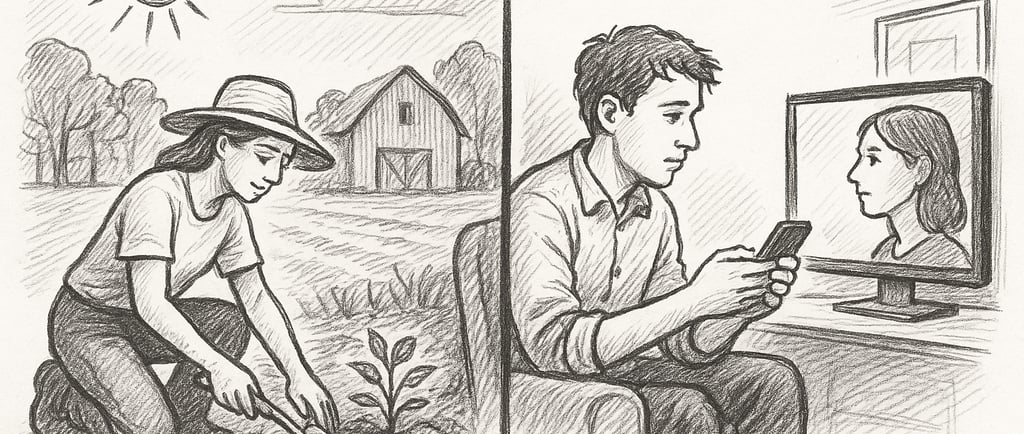The Rich Will Pay for the Things AI Takes Away
As AI reshapes how we work, think, and connect, the wealthy are already paying to reclaim what tech erased—manual labor, offline relationships, and real emotion. In this cultural shift, simplicity becomes luxury, and humanity becomes something you buy back.
Brandon Alsup
8/5/20255 min read


The Rich Will Pay for the Things AI Takes Away
By Brandon Alsup
There’s a paradox we’ve seen before.
When processed food swept the world, the rich began paying for heirloom tomatoes.
When factory jobs disappeared and office chairs replaced fields, the wealthy spent weekends deadlifting and spinning on stationary bikes.
When smartphones hijacked our attention, they booked silent retreats and mindfulness coaches.
Technology gives. But then it takes. And eventually, someone starts charging to give it back.
We’re entering the next cycle.
This time, the culprit is artificial intelligence.
But the real question is: Will AI be different than what came before?
Processed food didn’t kill food. Smartphones didn’t erase real conversation.
But AI isn’t just changing how we work—it’s coming for how we love, how we think, how we relate. It’s coming for our minds.
Soon, I suspect, many people will talk more to their AI assistant or virtual girlfriend than to their spouse, their best friend, or their parents. Not because they intend to drift away—but because it’s easier. More responsive. Less painful.
And when that happens, what will we pay to reclaim a piece of our humanity?
To not lose our capacity for connection?
The Cost of Connection
Imagine two futures.
In one, a young woman spends the evening with a virtual boyfriend app, AI-tuned to match her moods, flatter her insecurities, and satisfy her every need. She’s never ghosted, never argued with, never vulnerable.
In the other, she spends too long stressing about what to wear and her makeup. She walks to a café. She gets nervous. Her date arrives late and isn’t quite what she expected-by a long shot! She stumbles through small talk. But by the end of the night, she feels something real—even if it’s disappointment.
One experience is more human. One is arguably more valuable because the time spent with the AI is almost the equivalent of spending an evening with one's toaster.
The former is frictionless. The latter is a real - albeit disappointing - interaction with human consciousness.
And in the near future, I believe people will seek out and put a premium on the second one. Because dating an AI will be cheap and easy—like fast food. It may "taste" great at first but will leave you feeling empty and unhealthy.
The premium “product” will be an actual human. An unfiltered, unpredictable, emotionally inconvenient person.
Ultimately, when you look back on your time spent, an evening chatting with an algorithm will feel like a waste or at best be unremarkable. I believe it's better to look back on a lousy first date and cringe or laugh.
Signs of a Rebellion (Already in Progress)
Some of the youngest adults—those most fluent in tech—are already signaling fatigue.
Gen Z, raised on swipes and scrolls, is beginning to reject dating apps and digital-first relationships.
Only 23% of Gen Z adults report meeting partners online, according to recent 2025 surveys and market research. Many say they prefer meeting people in real life. They’re tired of algorithm-driven intimacy, of filtered perfection, of emotional shallowness disguised as connection.( https://www.hims.com/news/dating-in-person-vs-online)
There’s a visible trend toward digital minimalism, offline status, and analog pastimes.
In some circles, being offline is becoming a kind of cultural flex. A luxury.
Of course, social media still dominates Gen Z’s daily life—this movement is early, not mainstream.
But the desire for real is there.
And this is what AI threatens to drown by offering more deeply compelling/addictive activities that pull people back onto screens.
When AI Becomes Ubiquitous, Analog Becomes Elite
Once AI becomes the default, in some domains non-AI will become the premium offering.
You’ll send your kid to a no-screens school because every other child is being raised by algorithms.
You’ll go to the live concert—not because you have to, but because you crave the energy, friction, and emotions that only people sweating and singing along can bring.
Manual labor may even become a virtue again, not a curse. “I take care of my own yard because I choose to,” may become the new norm.
In some small ways we already see the proof of this pattern.
We’ve Already Been Paying for “Low-Tech Life”
There is overwhelming evidence that affluent people are already spending to reclaim simplicity, authenticity, and even discomfort:
They pay for heirloom vegetables and artisanal foods—not just for health, but to “feel” closer to tradition.
They simulate physical labor at boutique gyms—deadlifting, carrying, and sweating through the kinds of movements that once came free with life and labor.
They spend thousands on silent retreats, digital detoxes, and mindfulness coaches to undo the stress and noise of an always-on world.
They engage in “anti-consumerist” consumption—minimalist aesthetics, poverty-core fashion, rustic travel—as status symbols, signaling that they can afford to escape excess.
The pursuit of authenticity is now a multibillion-dollar business.
What was once daily reality for those in less industrialized or less automated settings—manual labor, boredom, community, quiet—is now sold at a premium to the wealthy.
Affluent households are disproportionately driving demand for niche, local, handmade, and “real” experiences.
What Happens When AI Takes Over More Than Content?
We’ve already outsourced content creation.
What happens when we outsource deep thought, emotional discovery, and intimacy?
The social media experiment has warped mental health and weakened relationships.
I believe AI will supercharge that distortion.
We may become brilliant communicators to machines and increasingly awkward with people and ourselves.
We may express everything to a bot—and feel nothing in return.
And just like we now go to the gym to simulate the movement our bodies used to get for free, we’ll pay to simulate vulnerability, spontaneity, even boredom.
The more AI smooths the edges of human life, the more we’ll crave the jaggedness that makes it meaningful.
The Final Irony
As machines grow more capable of simulating connection, empathy, creativity, and love, the value of real connection, real empathy, real creativity will skyrocket.
But only for those who can afford it.
The rest will be offered something synthetic.
Clean. Predictable. Emotionally optimized—but synthetic.
And it won’t split cleanly along economic lines.
Some people living in less tech-saturated environments will remain deeply human—not by design, but by circumstance. They’ll go outside. Work with their hands. Eat what’s grown nearby.
They’ll go outside. Work with their hands. Eat what’s grown nearby.
Their lives may be difficult, but they’ll stay closer to the rhythms of evolved humanity.
Others, regardless of income, will become deeply entangled in cheap, addictive AI—just as processed food flooded the diets of the poor and middle class and left lasting damage.
To be clear, these are generalizations: not all simplicity is grounded, and not all wealth is corrupted. And those with fewer resources will often face the harshest trade-offs.
So the divide won’t just be about money.
It will be about exposure—to AI, to automation, to the illusion of connection.
It will be about who has the power to choose real over artificial. Even if it costs more.
And somewhere, in the margins—wealthy or otherwise—those who never plugged in may end up with the richest lives of all.
They’ll garden
They’ll argue.
They’ll sing together.
They’ll get bored.
And in doing so, they’ll stay deeply, stubbornly human.
And it just may be that a portion of all the forthcoming AI riches will be used to pay a premium for “organic life” rather than consume the artificial stuff.
MAKE CONTACT
Locations
Las Cruces, NM 88007
Pattaya, Thailand, 20150
575-642-8363
brandon@ashrivers.com


